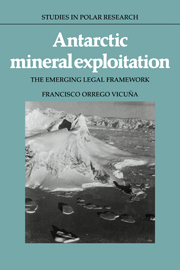Book contents
- Frontmatter
- Contents
- Preface
- Acknowledgement
- Abbreviations
- Part I The international legal framework of Antarctic co-operation and the development of resources
- 1 The evolution of the system of Antarctic co-operation and the influence of the development of resources
- 2 The Antarctic legal system and the development of a norm-creating function in the field of natural resources
- 3 Antarctic sovereignty and jurisdiction: new approaches for a resources policy
- 4 The Law of the Sea in the Antarctic Treaty system: its evolution in the light of the resources regime
- Part II Alternative approaches to the conservation and development of Antarctic minerals: the process of internal accommodation
- Part III Issues and options relating to the external accommodation
- Appendix 1 The Antarctic Treaty
- Appendix 2 Table of signatures and ratifications
- Table of Cases
- Table of Statutes and national legislation
- Table of Treaties
- Bibliography
- Index
4 - The Law of the Sea in the Antarctic Treaty system: its evolution in the light of the resources regime
Published online by Cambridge University Press: 04 November 2009
- Frontmatter
- Contents
- Preface
- Acknowledgement
- Abbreviations
- Part I The international legal framework of Antarctic co-operation and the development of resources
- 1 The evolution of the system of Antarctic co-operation and the influence of the development of resources
- 2 The Antarctic legal system and the development of a norm-creating function in the field of natural resources
- 3 Antarctic sovereignty and jurisdiction: new approaches for a resources policy
- 4 The Law of the Sea in the Antarctic Treaty system: its evolution in the light of the resources regime
- Part II Alternative approaches to the conservation and development of Antarctic minerals: the process of internal accommodation
- Part III Issues and options relating to the external accommodation
- Appendix 1 The Antarctic Treaty
- Appendix 2 Table of signatures and ratifications
- Table of Cases
- Table of Statutes and national legislation
- Table of Treaties
- Bibliography
- Index
Summary
The maritime extension of the Antarctic Treaty system
The national positions that have been explained have a determining influence on the approach of each country or group of countries to the problems related to the application of the law of the sea in Antarctica. The central question that has arisen in this regard is whether the subjection of maritime zones to national jurisdiction is a concept that can be made applicable to the situation of the Antarctic. Given the close links between the concepts of the territorial sea, the exclusive economic zone and the continental shelf and the territory of a coastal State from which these concepts derive, the territorial status of the continent is the starting point for developing a reply to this question.
The complexity of the problem is due not only to the different positions that have been adopted by the Treaty parties with regard to this territorial status but also to the fact that a process of rapid development in the international law of the sea itself was initiated simultaneously with the development of the Antarctic system. It may reasonably be stated that, at the time when the Antarctic Treaty was signed, the continental shelf doctrine was already established in customary international law in addition to the jurisdictional concepts governing traditional maritime areas such as the territorial sea and the high seas.
- Type
- Chapter
- Information
- Antarctic Mineral ExploitationThe Emerging Legal Framework, pp. 127 - 182Publisher: Cambridge University PressPrint publication year: 1988



